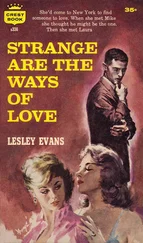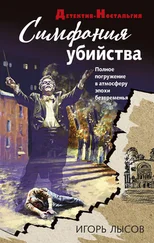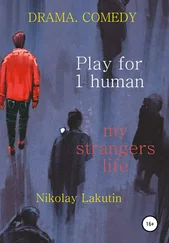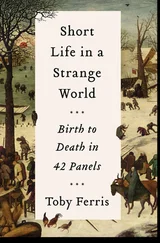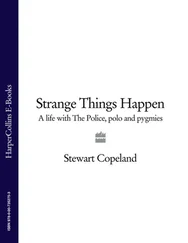Douglas Hofstadter - I Am a Strange Loop
Здесь есть возможность читать онлайн «Douglas Hofstadter - I Am a Strange Loop» весь текст электронной книги совершенно бесплатно (целиком полную версию без сокращений). В некоторых случаях можно слушать аудио, скачать через торрент в формате fb2 и присутствует краткое содержание. Жанр: Прочая документальная литература, на английском языке. Описание произведения, (предисловие) а так же отзывы посетителей доступны на портале библиотеки ЛибКат.
- Название:I Am a Strange Loop
- Автор:
- Жанр:
- Год:неизвестен
- ISBN:нет данных
- Рейтинг книги:4 / 5. Голосов: 1
-
Избранное:Добавить в избранное
- Отзывы:
-
Ваша оценка:
- 80
- 1
- 2
- 3
- 4
- 5
I Am a Strange Loop: краткое содержание, описание и аннотация
Предлагаем к чтению аннотацию, описание, краткое содержание или предисловие (зависит от того, что написал сам автор книги «I Am a Strange Loop»). Если вы не нашли необходимую информацию о книге — напишите в комментариях, мы постараемся отыскать её.
I Am a Strange Loop — читать онлайн бесплатно полную книгу (весь текст) целиком
Ниже представлен текст книги, разбитый по страницам. Система сохранения места последней прочитанной страницы, позволяет с удобством читать онлайн бесплатно книгу «I Am a Strange Loop», без необходимости каждый раз заново искать на чём Вы остановились. Поставьте закладку, и сможете в любой момент перейти на страницу, на которой закончили чтение.
Интервал:
Закладка:
Y. Ted Enrustle, poor fellow, was simply gobsmacked — there’s no other word for it. How could anyone in their right mind take Qéé Dzhii’s lines in this preposterous fashion? They were only about numbers ! After all, to write a drama that was about numbers and only about numbers had been his sole ambition, and he had slaved away for years to accomplish that noble goal!
Y. Ted Enrustle lashed out vehemently in print, maintaining that his play was decidedly not about a play, let alone about itself! Indeed, he went so far as to insist that Gerd Külot’s review could not conceivably be about Prince Hyppia: Math Dramatica but had to be about another play, possibly a related play, perhaps an analogous play, perchance even a perfectly parallel play, peradventure a play with a similar-sounding title penned by a pair of paranoiac paradoxophobes, but in any case it was not about his play.
And yet, protest though he might, there was nothing at all that Y. Ted Enrustle could do about how audiences were now interpreting his beloved play’s lines, because the two notions — the sauciness of certain integers and the unpennability of certain lines of theatrical dialogue — were now seen by enlightened playgoers as precisely isomorphic phenomena (every bit as isomorphic as the parallel escapades of Aurélie and Pomponnette). The subtle mapping discovered by the impish Külot and gleefully revealed in his review made both meanings apply equally well (at least to anyone who had read and understood the review). The height of the irony was that, in the case of a few choice arithmetical remarks such as Prince Hyppia’s famous outburst, it was easier and more natural to hear them as referring to unpennable lines in plays than to hear them as referring to non-prim numbers! But Y. Ted Enrustle, despite reading Külot’s review many times, apparently never quite caught on to what it was really saying.
Analogy, Once Again, Does its Cagey Thing
Okay, okay, enough’s enough. The jig’s up! Let me confess. For the last several pages, I’ve been playing a game, talking about strangely named plays by strangely named playwrights as well as a strangely titled review by a strangely named reviewer, but the truth is (and you knew it all along, dear reader), I’ve really been talking about something totally different — to wit, the strange loop that Austrian logician Kurt Gödel (Gerd Külot) discovered and revealed inside Russell and Whitehead’s Principia Mathematica.
“Now, now,” I hear some voice protesting (but of course it’s not your voice), “how on earth could you have really been talking about Whitehead and Russell and Principia Mathematica if the lines you wrote were not about them but about Y. Ted Enrustle and Prince Hyppia: Math Dramatica and such things?” Well, once again, it’s all thanks to the power of analogy; it’s the same game as in a roman à clef, where a novelist speaks, not so secretly, about people in real life by ostensibly speaking solely about fictional characters, but where savvy readers know precisely who stands for whom, thanks to analogies so compelling and so glaring that, taken in their cultural context, they cannot be missed by anyone sufficiently sophisticated.
And so we have worked our way up my ladder of examples of doubly-hearable remarks, all the way from the throwaway café blurt “This tastes awful” to the supersophisticated dramatic line “The number g is not prim”. We have repeatedly seen how analogies and mappings give rise to secondary meanings that ride on the backs of primary meanings. We have seen that even primary meanings depend on unspoken mappings, and so in the end, we have seen that all meaning is mapping-mediated, which is to say, all meaning comes from analogies. This is Gödel’s profound insight, exploited to the hilt in his 1931 paper, bringing the aspirations embodied in Principia Mathematica tumbling to the ground. I hope that for all my readers, understanding Gödel’s keen insight into meaning is now a piece of cake.
How Can an “Unpennable” Line be Penned?
Something may have troubled you when you learned that Prince Hyppia’s famous line about the number g proclaims (via analogy) its own unpennability. Isn’t this self-contradictory? If some line in some play is truly unpennable, then how could the playwright have ever penned it? Or, turning this question around, how could Prince Hyppia’s classic line be found in Y. Ted Enrustle’s play if it never was penned at all?
A very good question indeed. But now, please recall that I defined a “pennable line” as a line that could be written by a playwright who was tacitly adhering to a set of well-established dramaturgical conventions. The concept of “pennability”, in other words, implicitly referred to some particular system of rules. This means that an “unpennable” line, rather than being a line that could never, ever be written by anyone, would merely be a line that violated one or more of the dramaturgical conventions that most playwrights took for granted. Therefore, an unpennable line could indeed be penned — just not by someone who rigorously respected those rules.
For a strictly rule-bound playwright to pen such a line would be seen as extremely inconsistent; a churlish drama critic, ever reaching for cute new ways to snipe, might even write, “X’s play is so mega-inconsistent!” And thus, perhaps it was the recognition of Y. Ted Enrustle’s unexpected and bizarre-o “mega-inconsistency” that invariably caused audiences to gasp at Prince Hyppia’s math-dramatic outburst. No wonder Gerd Külot received kudos for pointing out that a formerly unpennable line had been penned!
“Not” is Not the Source of Strangeness
A reader might conclude that a strange loop necessarily involves a self-undermining or self-negating quality (“This formula is not provable”; “This line is not pennable”; “You should not be attending this play”). However, negation plays no essential role in strange loopiness. It’s just that the strangeness becomes more pungent or humorous if the loop enjoys a self-undermining quality. Recall Escher’s Drawing Hands. There is no negation in it — both hands are drawing. Imagine if one were erasing the other!
In this book, a loop’s strangeness comes purely from the way in which a system can seem to “engulf itself ” through an unexpected twisting-around, rudely violating what we had taken to be an inviolable hierarchical order. In the cases of both Prince Hyppia: Math Dramatica and Principia Mathematica, we saw that a system carefully designed to talk only about numbers and not to talk about itself nonetheless ineluctably winds up talking about itself in a “cagey” fashion — and it does so precisely because of the chameleonic nature of numbers, which are so rich and complex that numerical patterns have the flexibility to mirror any other kind of pattern.
Every bit as strange a loop, although perhaps a little less dramatic, would have been created if Gödel had concocted a self- affirming formula that cockily asserted of itself, “This formula is provable via the rules of PM ”, which to me is reminiscent of the brashness of Muhammad (“I’m the greatest”) Ali as well as of Salvador (“The great”) Dalí. Indeed, some years after Gödel, such self-affirming formulas were concocted and studied by logicians such as Martin Hugo Löb and Leon Henkin. These formulas, too, had amazing and deep properties. I therefore repeat that the strange loopiness resides not in the flip due to the word “not”, but in the unexpected, hierarchy-violating twisting-back involving the word “this”.
Читать дальшеИнтервал:
Закладка:
Похожие книги на «I Am a Strange Loop»
Представляем Вашему вниманию похожие книги на «I Am a Strange Loop» списком для выбора. Мы отобрали схожую по названию и смыслу литературу в надежде предоставить читателям больше вариантов отыскать новые, интересные, ещё непрочитанные произведения.
Обсуждение, отзывы о книге «I Am a Strange Loop» и просто собственные мнения читателей. Оставьте ваши комментарии, напишите, что Вы думаете о произведении, его смысле или главных героях. Укажите что конкретно понравилось, а что нет, и почему Вы так считаете.



